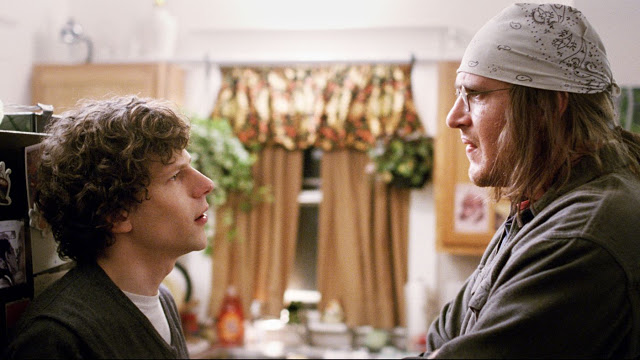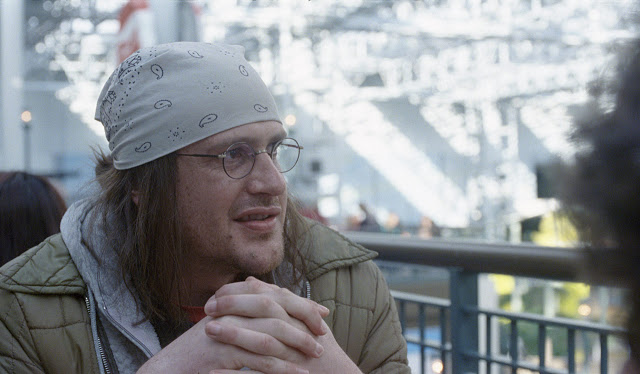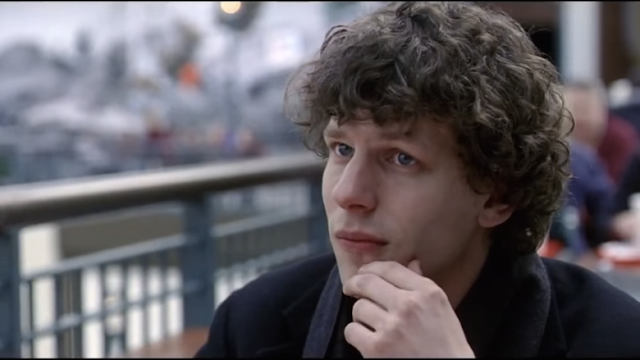Writing in the New York Times in 1996 about Infinite Jest, the magnum opus from David Foster Wallace, the critic Jay McInerney wrote, “While there are many uninteresting pages in this novel, there are not many uninteresting sentences.” I feel similarly about The End of the Tour, James Ponsoldt’s compassionate, provocative, and occasionally dull recreation of the five-day period shortly following the release of Infinite Jest, in which Rolling Stone‘s David Lipsky trailed Wallace on his promotional rounds. It is not an especially kinetic movie, and if it is in no hurry to go anywhere, its luxuriant patience occasionally creeps into stasis. But it is also a sharply scripted and profoundly affecting character study, tenderly depicting two writers who are deeply committed both to their specific jobs and to the grander notion of composing meaningful words. Wallace and Lipsky both believed that their prose, as painful as it was to conceive, might actually mean something. The End of the Tour nobly honors their commitment, even if certain stretches of its narrative feel meaningless.
The movie opens in 2008, with a dumbfounded Lipsky (Jesse Eisenberg, even better than usual) learning of Wallace’s suicide, a tragic event whose dark shadow looms over The End of the Tour. It then flashes back 12 years, revealing Lipsky as a hungry and energetic young writer who keeps hearing about this rapturously received tome called Infinite Jest. Animated by both jealousy and disbelief, he scoffs at the reviews claiming that this mammoth novel heralds the arrival of the next Pynchon. Then he reads it. Not long after, he’s pleading with his editor at Rolling Stone to interview Wallace for a celebrity profile, and then he’s jetting off to snowy Illinois, hoping to reconcile this generation-defining book with the mere mortal who wrote it.
The first meeting between Lipsky and Wallace (Jason Segel, giving what is certain to be labeled a career-transforming performance) sets the tone for The End of the Tour. Wallace greets Lipsky with a careless handshake, more worried about his two hyperactive Labradors than his new guest. Lipsky wastes no time switching on his tape recorder, and while the two men are nervously sizing one another up, one of them makes an offhand comment about television and masturbation. And then they’re off, arguing in earnest about the social utility of the two pursuits and whether it’s more meaningful to actually fantasize about another person or to watch fantasies play out on TV.
What is the point of this conversation? Who says there needs to be a point? It would be inaccurate to describe The End of the Tour as plotless; it has a clear beginning, middle, and end. But it is less concerned with pushing its characters forward than with circling around them, meticulously charting the ebb and flow in the tentative relationship that develops between its proud, insecure protagonists. Ponsoldt, whose The Spectacular Now remains one of the unappreciated jewels of the past several years, adopts a fly-on-the-wall approach, sacrificing energy for intimacy. It’s a tradeoff with real costs. Despite a catchy soundtrack (the quiet melodies of R.E.M. pop up regularly), The End of the Tour isn’t particularly cinematic, and it occasionally seems as though Ponsoldt was so wary of interfering with his actors’ exchanges that he forgot he was holding a camera. Yet at the same time, his unfussy technique affords viewers a rare kind of closeness. When Wallace and Lipsky talk—and they spend virtually the whole film talking—you feel less like you’re watching a movie than as if you’ve somehow stumbled into a room with the characters, only they’re too self-involved to notice you’re even there.
The dialogue in The End of the Tour is very good—intelligent, certainly, but in an organic and realistic way (the screenplay is by playwright Donald Margulies, adapting Lipsky’s book)—but the words themselves are less important than who’s speaking them, and why. Wallace and Lipsky’s conversations range from the academic (so, just what is Infinite Jest about, anyway?) to the personal (Wallace repeatedly talks about his ever-present fear of loneliness, as well as his battles with alcoholism) to the banal (the two eagerly discuss, at various points, the approachable hotness of Alanis Morissette and the glory of the original Die Hard). Yet underlying everything is an unrelenting game of thrust-and-parry; Lipsky persistently attempts to decode this writer who has created a seismically relevant work, while Wallace steadfastly presents himself as a relatively normal dude who happens to be good with words.
This results in an intriguing sense of mystery about who Wallace is, a mystery that Lipsky can never quite solve. The reporter views the novelist with a combination of envy and awe, but what maddens Lipsky is how Wallace continually insists that these feelings are misguided, even though all evidence—most notably the 1,079 pages of Infinite Jest (which, I should disclose, I’ve never read)—suggests to the contrary. Of course, what Lipsky (himself a novelist) really desires to do is surpass Wallace, but how can he do that if he can’t even understand him?
Best of luck. Wallace is friendly enough—he’s so lonely generally, he seems to enjoy having someone to talk to—but he’s disinclined to decrypt himself for his meddling interviewer. “I treasure my regular-guyness,” he says, and his appearance backs that up, with his unsexy spectacles and his stringy shoulder-length hair perpetually clamped by a bandana. And when Lipsky explains that he’s unmarried because he can’t “cast that role” of a women to permanently fit in his “mental landscape” of domestic bliss, Wallace responds that he can’t frame his thoughts on the topic that eloquently, the first of many demurrals of intellect. But this is false modesty—it’s clear that Wallace is simply operating on a different level from everyone else—and this is where the imperceptible subtlety of Segel’s performance is so crucial. Whether it’s his casual deployment of the word “axiom” or the way his eyes narrow when Lipsky casually chats up his ex-girlfriend (the movie’s only real attempt at generating a frisson of tension), Segel makes clear that Wallace’s brain is constantly firing, and that he’s always thinking three moves ahead. The natural response to the news of Segel’s casting was that Ponsoldt had hired a dumb actor to play someone smart. The brilliance of the performance is that Segel reveals Wallace as a smart guy playing dumb.
Yet as good as Segel is, The End of the Tour belongs to Eisenberg. His Lipsky is a hauntingly real and fragile figure, somehow both sycophantic and predatory. He is constantly extolling Wallace’s genius, and there is undeniable sincerity in his praise. Yet he also wants to extract that genius, bottle it, and use it for his own selfish ends. Eisenberg dexterously evokes the impulses warring within Lipsky: the resentment mingling with curiosity, the ambition mixed with admiration. Yes, he wants to write a killer story for Rolling Stone, but he also truly wants to discover just how a man who can barely look after his dogs could also be mentioned in the same breath as Hemingway. One of the movie’s best scenes occurs when Lipsky briefly finds himself alone in Wallace’s house, and he springs into action, narrating breathlessly into his tape recorder as he catalogues all of the adornments that he sees on the walls and furniture before finally stopping himself. It’s a moment that encapsulates all of the feelings swirling within him, one after the other flickering across Eisenberg’s face. The most powerful of these, tucked beneath the greed and the bitterness and the shame, is genuine sympathy; Lipsky recognizes with acute clarity that, as brilliant as Wallace may be, he is nevertheless plagued by isolation, self-doubt, and sadness.
You would think that sadness would be the dominant emotion in a movie about David Foster Wallace, given how his life ended. And it is certainly bittersweet to spend time with this prodigiously gifted writer, knowing all the while that he battled such demons, and that he died so young. Yet at the same time, The End of the Tour feels like a celebration, a poignant ode to the labors of the creative process that its subject mastered so thoroughly, even if they arguably consumed him. That may be why Ponsoldt concludes matters not with a eulogy but with a victory, a silent shot of Wallace dancing jubilantly at a local church. Sure, it’s just a big guy with long hair letting loose, but it is also a potent reminder of how art—books, dance, and even movies—can save us from our loneliness.
Jeremy Beck is the editor-in-chief of MovieManifesto. He watches more movies and television than he probably should.



